Firefighters Officially End Search for Bodies at Collapsed Florida Condo
Forensic specialists continue working to identify human remains; inspector warns unstable retaining wall could cause site and nearby road to collapse.
Firefighters on Friday declared the end of their search for bodies at the site of a collapsed Florida condo building, concluding a month of painstaking work removing layers of dangerous debris that were once piled several stories high.
The June 24 collapse at the oceanside tower killed 97 people, with at least one more missing person yet to be identified. The site has been mostly swept flat and the rubble moved to a Miami warehouse. Although forensic scientists are still at work, including examining the debris at the warehouse, there are no more bodies to be found where the building once stood.
Except during the early hours after the collapse, survivors never emerged. Search teams spent weeks battling the hazards of the rubble, including an unstable portion of the building that teetered above, a recurring fire and Florida’s stifling summer heat and thunderstorms. They went through more than 14,000 tons (13,000 metric tonnes) of broken concrete and rebar, often working boulder by bounder, rock by rock, before finally declaring the mission complete.
Miami-Dade Fire Rescue’s urban search-and-rescue team pulled away from the disaster site Friday in a convoy of firetrucks and other vehicles, slowly driving to their headquarters for a news conference to announce that the search was officially over.
At a ceremony, Fire Chief Alan Cominsky saluted the firefighters who worked 12-hour shifts while camping out at the site.
“It’s obviously devastating. It’s obviously a difficult situation across the board,” Cominsky said. “I couldn’t be prouder of the men and women that represent Miami-Dade Fire Rescue.”
Members of Florida Task Force teams 1 and 2 went home today after 29 days of search, rescue and recovery efforts at the site of the Surfside condo collapse. Before they left, they paid their respects to those who were killed in the tragedy.
MORE: https://t.co/UpHpXO0zWv pic.twitter.com/6W0viAWB50— WSVN 7 News (@wsvn) July 23, 2021
Officials have declined to clarify whether they have one additional set of human remains in hand that pathologists are struggling to identify or whether a search for that final set of remains continues.
If found, Estelle Hedaya would bring the death toll to 98.
Hedaya was an outgoing 54-year-old who loved to travel and was fond of striking up conversations with strangers. Her younger brother Ikey has given DNA samples and visited the site twice to see the search efforts for himself.
“As we enter month two alone, without any other families, we feel helpless,” he told The Associated Press on Friday. He said he gets frequent updates from the medical examiner’s office.
Leah Sutton, who knew Hedaya since birth and considered herself a second mother to her, is worried that she will be forgotten.
“They seem to be packing up and congratulating everyone on a job well done. And yes, they deserve all the accolades, but after they find Estelle.”
The collapse also fueled a race to inspect other aging residential towers in Florida and beyond, and it raised broader questions about the nation’s regulations governing condominium associations and building safety.
Shortly after the collapse, it became clear that warnings about Champlain Towers South, which opened in 1981, had gone unheeded. A 2018 engineering report detailed cracked and degraded concrete support beams in the underground parking garage and other problems that would cost nearly $10 million to fix.
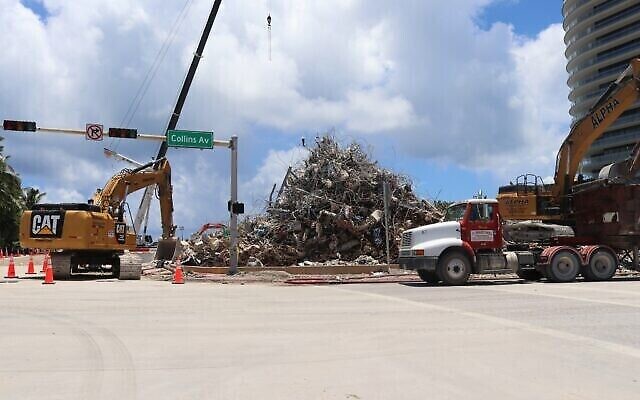
The repairs did not happen, and the estimate grew to $15 million this year as the owners of the building’s 136 units and its governing condo board squabbled over the cost, especially after a Surfside town inspector told them the building was safe.
A complete collapse was all but impossible to imagine. As many officials said in the catastrophe’s first days, buildings of that size do not just collapse in the US outside of a terrorist attack. Even tornadoes, hurricanes and earthquakes rarely bring them down.
The disaster was one of the nation’s deadliest engineering failures. A set of overhead walkways collapsed at a Kansas City hotel in 1981, killing 114 people attending a dance. But that wasn’t the structure itself. A Washington, DC, movie theater collapsed in 1922, killing 98. But that came after a blizzard dumped feet of snow on the flat roof.
In the weeks after the collapse, a 28-story courthouse in downtown Miami, built in 1928, and two apartment buildings were closed after inspectors uncovered structural problems. They will remain shut until repairs are made.
The first calls to 911 came at about 1:20 a.m., when Champlain residents reported that the parking garage had collapsed. A woman standing on her balcony called her husband, who was on a business trip, and said the swimming pool had fallen into the garage.
Then, in an instant, a section of the L-shaped building fell straight down. Eight seconds later, another section followed, leaving 35 people alive in the standing portion. In the initial hours, a teen was rescued, and firefighters believed others might be found alive. They took hope from noises emanating from inside the pile that might have been survivors tapping, but in retrospect the sounds came from shifting debris.
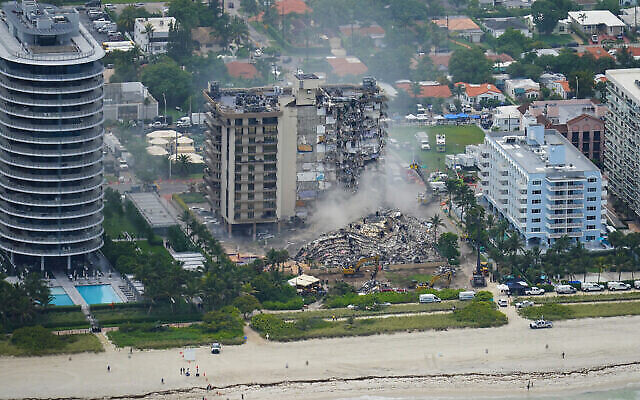
Rescue crews worked tirelessly, even when smoke and heat from a fire inside the building’s standing portion hampered their efforts. They persisted when the temperatures pushed into the upper 90s (35 Celsius) under the blazing sun, some toiling until they needed IVs to replenish fluids. They carried on when Tropical Storm Elsa passed nearby and dumped torrential rain. They left the pile only when lightning developed.
In the end, crews found no evidence that anyone who was found dead had survived the initial collapse, Cominsky said.
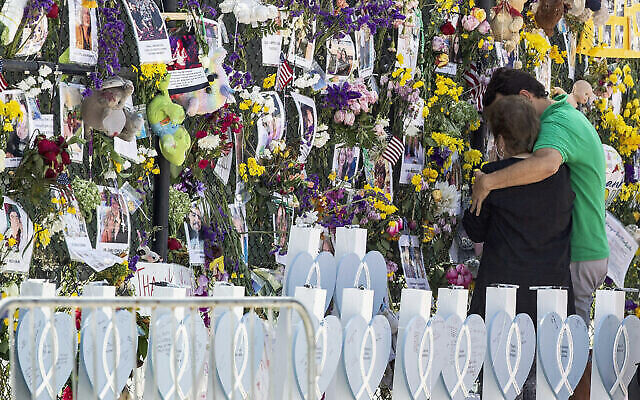
The dead included members of the area’s large Orthodox Jewish community, the sister of Paraguay’s first lady, her family and their nanny, as well as a local salesman, his wife and their two young daughters.
The portion of the building that remained standing posed another grave threat as it loomed precariously above the workers. Authorities ordered it demolished on July 4.
Structural engineer Allyn Kilsheimer told Surfside and Miami-Dade officials in a letter Thursday that Collins Avenue, the main thoroughfare on the barrier islands in and around Miami Beach, could crumble because a remaining perimeter wall near the road could fail. The development was first reported Friday by the Miami Herald and WPLG.
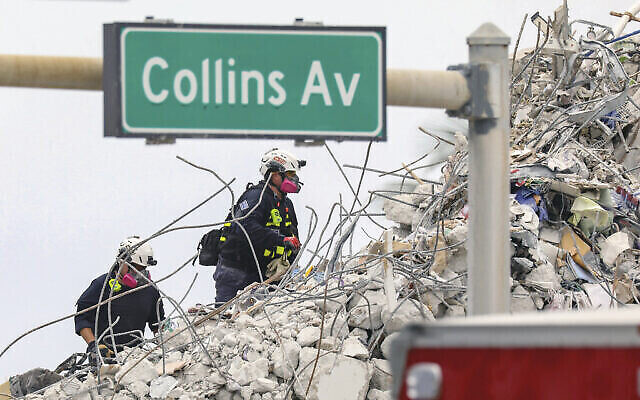
All that remains of the Champlain building are the walls of the underground parking garage, around a hollowed-out foundation. Kilsheimer said that without more support for those walls, nearby traffic could make them collapse, with parts of the street falling into the void.
“If the wall were to collapse or rotate substantially, the retained soil under the street and sidewalk could move with it,” wrote Kilsheimer, of KCE Structural Engineers.
He recommended building an earthen berm to support the walls near the street and sidewalk. Otherwise, the movement “could cause portions of the street to collapse and could seriously compromise the utilities under the street,” he wrote.
Miami-Dade County is bringing in crews to help shore up the remaining underground walls, Rachel Johnson, the county’s communications director, told the Herald.
“We are moving to procure a company to do shoring and bracing of the walls to assure there is no risk,” she said.
The National Institute of Standards and Technology, a federal agency investigating the collapse, has been monitoring the site’s safety.
- World News
- News
- David Fischer
- Alan Cominsky
- Estelle Hedaya
- The Associated Press
- Times of Israel
- Champlain Towers South
- Tropical Storm Elsa
- Kansas City
- Miami
- Washington DC
- Surfside Florida
- Allyn Kilsheime
- Rachel Johnson
- The National Institute of Standards and Technology
- Terry Spencer
- Miami-Dade Fire Rescue



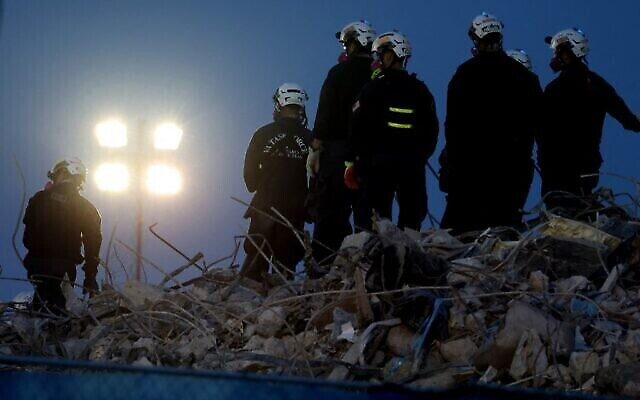
comments